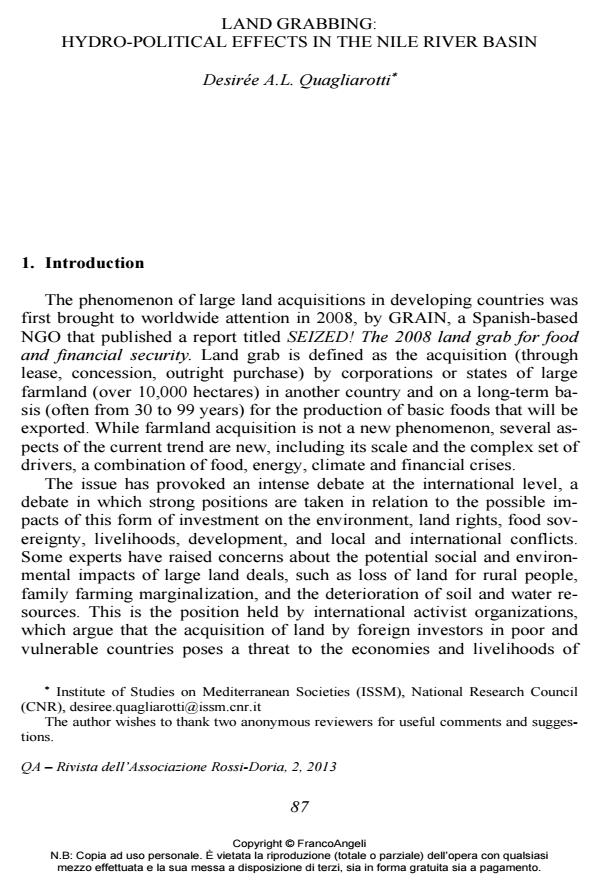Land grabbing: hydro-political effects in the Nile river basin
Titolo Rivista QA Rivista dell’Associazione Rossi-Doria
Autori/Curatori Desirée A.L. Quagliarotti
Anno di pubblicazione 2013 Fascicolo 2013/2 Lingua Inglese
Numero pagine 22 P. 87-108 Dimensione file 481 KB
DOI 10.3280/QU2013-002004
Il DOI è il codice a barre della proprietà intellettuale: per saperne di più
clicca qui
Qui sotto puoi vedere in anteprima la prima pagina di questo articolo.
Se questo articolo ti interessa, lo puoi acquistare (e scaricare in formato pdf) seguendo le facili indicazioni per acquistare il download credit. Acquista Download Credits per scaricare questo Articolo in formato PDF

FrancoAngeli è membro della Publishers International Linking Association, Inc (PILA)associazione indipendente e non profit per facilitare (attraverso i servizi tecnologici implementati da CrossRef.org) l’accesso degli studiosi ai contenuti digitali nelle pubblicazioni professionali e scientifiche
Il fenomeno del land grabbing sta alimentando un intenso dibattito a causa dei suoi potenziali impatti ambientali e socio-economici. Questo articolo vuole fornire un’analisi sui legami esistenti tra acquisizioni di terra e sfruttamento delle risorse idriche, focalizzandosi sul caso-studio del bacino del Nilo. L’abbondanza relativa di risorse naturali strategiche per la produzione agricola sta attirando investitori stranieri diffondendo il fenomeno del land grabbing in diversi Paesi rivieraschi del bacino del Nilo. Il nuovo contesto geopolitico, la crescita della popolazione del bacino e le previsioni riguardo la disponibilità idrica a causa dei cambiamenti climatici rendono le acque del Nilo una risorsa strategica fondamentale per l’equilibrio idropolitico della regione
Keywords:Land grabbing, Water grabbing, Bacino del Nilo, Idropolitica
- Ashebir E. (2009), The Politics of the Nile Basin, Master’s Thesis, University of Witwatersrand, Johannesburg.
- Borger J. (2008), Rich Countries Launch Great Land Grab to Safeguard Food Supply, The Guardian, 22, November, p. 1.
- Cascão A.E. (2009), «Changing Power Relations in the Nile River Basin: Unilateralism vs. Cooperation?», Water Alternatives, 2, 2, pp. 245-268.
- Cascão A.E. (2011), South Sudan. At the Nile’s Hydropolitical Crossroads, available on line: http://www.siwi.org/documents/Resources/Water_Front_Articles/2011/WF_2_2011_Sudan.pdf. (last access: 11 June 2012).
- Collins R.O. (2006), «Negotiations and Exploitation of the Nile Waters at the End of Millennium», Water International, 31, 1, pp. 116-126.
- Deininger K., Byerlee D. (2011), Rising Global Interest in Farmland. Can it Yield Sustainable and Equitable Benefits?, The World Bank, Washington, Dc.
- Deng D.K. (2011a), Understanding Land Investment Deals in Africa. Country Report: South Sudan, The Oakland Institute, Oakland.
- Deng D.K. (2011b), «The New Frontiers. A Baseline of Large-Based Investment in Southern Sudan», Report, 1/11, Norwegian People’s Aid, Oslo.
- Deng D.K. (2011c),“Land Belongs to the Community”. Demystifying the “Global Land Grab” in Southern Sudan, International Conference on “Global land Grabbing”, 6-8 April, Brighton, UK.
- FAO (2011a), Information Products for Nile Basin Water Resources Management. Synthesis Report, FAO, Rome.
- FAO (2011b), Save and Growth. A Policy-Maker’s Guide to the Sustainable Intensification of Smallholder Crop Production, FAO, Rome.
- FAO, Aquacrop, available on line: http://www.fao.org/nr/water/aquacrop.html. (last access: 11 July 2012).
- IRIN (2008), Egypt: Scientists Uncertain about Climate Change Impact on Nile, available on line: http://www.irinnews.org/printreport.aspx?reportid=77062 (last access: 11 July 2012).
- IWMI (2010), Water availability and access, available on the web at: http://www.iwmi.cgiar.org/research_impacts/Research_Themes/Theme_1/index.aspx (last access: 11 July 2012).
- GRAIN (2008), “SEIZED! The 2008 Land Grab for Food and Financial Security”, GRAIN Briefing, Barcelona, available on line: http//www.grain.org/briefings_files/landgrab-2008-en.pdf. (last access: 14 May 2012).
- Jägerskog A., Cascão A., Hårsmar M., Kim K. (2012), «Land Acquisition: How They Will Impact Transboundary Waters?», SIWI Report 30, Stockholm.
- Kugelman M., Levenstein S.L. (eds.) (2009), Land Grab? The Race for the World’s Farmland, Woodrow Wilson International Center for Scholars, Washington, Dc.
- Ministry of Agriculture and Rural Development (MoARD), Ethiopian agricultural portal, available on line: http://www.eap.gov.et. (last access: 1 June 2012).
- Ministry of Finance and Economic Development (MoFED) (2010), Growth and Transformation Plan (GTP), MoFED, Addis Abeba.
- Mousseau F., Sosnoff G. (2011), Understanding Land Investment Deals in Africa. Country Report: Ethiopia, The Oakland Institute, Oakland.
- The Oakland Institute (2011), «Understanding Land Investment Deals in Africa. Saudi Star in Ethiopia», Land Deal Brief, The Oakland Institute, Oakland.
- Rahmato D. (2011), Land to Investors: Large-Scale Land Transfers in Ethiopia, Forum for Social Studies, Addis Abeba.
- Steffen W., Persson A., Deutsch L., Zalasiewicz J., Williams M., Richardson K., Crumley C., Crutzen P., Folke C., Gordon L., Molina M., Ramanathan V., Rockström J., Scheffer M., Schellnhuber H.J., and Svedin U. (2011), «The Anthropocene: From Global Change to Planetary Stewardship», Ambio, 40, 7, pp. 739-761.
- Vidal J. (2012), «Economic Disasters Beckons as Water-Hungry Investors Buy Up Africa’s Land», The Guardian, 31 August, p. 1.
- Warner J., Sebastian A., Empinotti V. (2013), «Claming (Back) the Land. The Geopolitics of Egyptian and South African Land and Water Grabs», in Allan T., Keulerts M., Sojamo S., Warner J. (eds.), Handbook of Land and Water Grabs in Africa. Foreign Direct Investment and Food and Water Security, Routledge, Abingdon, UK, pp. 223-242.
Desirée A.L. Quagliarotti, Land grabbing: hydro-political effects in the Nile river basin in "QA Rivista dell’Associazione Rossi-Doria" 2/2013, pp 87-108, DOI: 10.3280/QU2013-002004